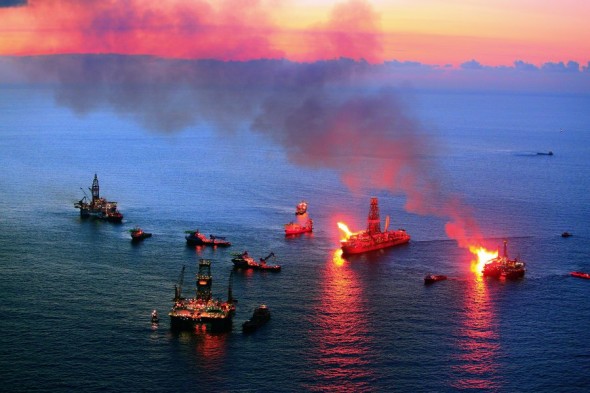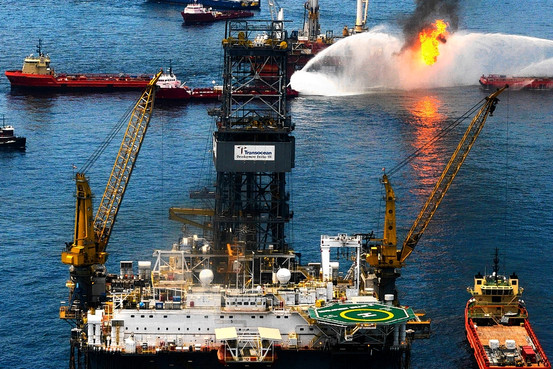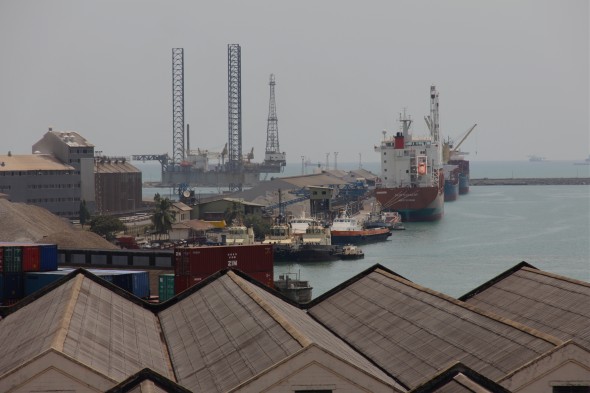Corexit and a never-ending supply of oil
Al Jazeera English is one of the few news organizations in the U.S. keeping the Deepwater Horizon story alive. While others have forgotten the disaster, Al Jazeera has broadcast a number of stories on the ongoing environmental problems in the Gulf of Mexico. The mess that oil made recently aired on Inside Story Americas.
The Huffington Post also featured an article by David Kirby on the Corexit scandal, Corexit, Oil Dispersant Used By BP, Is Destroying Gulf Marine Life, Scientists Say.
BP’s negligence prior to the Deepwater Horizon has been reported extensively. But had this accident occurred on land it could have been contained much more quickly. Today oil companies are after oil that’s harder and more dangerous to drill. Disaster response technology has not kept up and one can only when the next disaster will occur. A new article published in The Atlantic and Mother Jones, What if we never run out of oil?, describes the latest efforts to get at frozen gas miles under the ocean surface. A miracle — and a nightmare — writes author, Charles Mann. Indeed.
From one disaster to another
The two year anniversary of the Deepwater Horizon explosion is just a days away, and as Bryan Walsh from Time magazine puts it, the “oil spill seems to divide people into two categories: those who can’t forget, and those who refuse to remember. In the first camp are Gulf Coast residents and environmentalists who say the region still hasn’t recovered from the worst oil spill in U.S. history, and who are still waiting to be made whole—as BP once promised. In the second is much of the oil industry and many Republicans, who like to complain that offshore drilling has slowed under President Obama, yet seem to forget the multi-billion dollar damage that the oil spill left, and the months it took to repair the Macondo blowout.”
You can read more in his article, Nearly two years on, did the BP oil spill have to happen to BP?
And while we’re wondering about the inevitability of BP’s spill, Total’s North Sea gas leak appears to be much worse than originally reported:
Sitting on a powder keg of highly flammable natural gas and gas condensate, the French oil major’s rig could be one of the worst oil disasters in the North Sea. A gas cloud, made mostly of methane, has essentially enveloped the rig after attempts to shut a troubled production failed and caused a leak. If this cloud — which is growing by roughly 200,000 cubic meters a day — ignites, it could be catastrophic.
Clearly, the potential for human and environmental tragedy is the paramount concern here, much as it was with BP’s Gulf of Mexico disaster.
One year already…
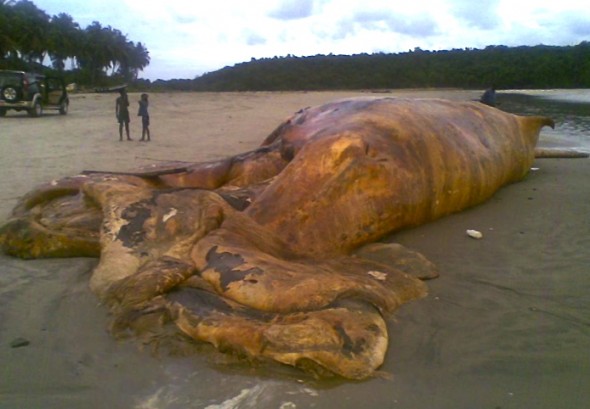
The eighth dead whale to wash ashore in the Western Region since late 2009. The Ghana EPA says there's no connection to oil drilling, but doesn't offer any details to back up the assertion. Photo courtesy of Friends of the Nation.
Yes, Ghana has been an oil producing nation for one year now.
One year on and where do things stand? In terms of environmental oversight, not much has changed and there remains much progress to make.
Voices from the Gulf: Best Place
Have you seen this? BP is out to win the hearts and minds of Gulf Coast residents with upbeat videos on YouTube. Everything is great! Based on the comments I’ve read so far, it doesn’t look like their campaign is having much success.
Recent news accounts also paint a more nuanced picture of Gulf Coast “recovery”: BIRMINGHAM, Ala. — Tar balls washed onto Gulf of Mexico beaches by Tropical Storm Lee earlier this month show that oil left over from last year’s BP spill isn’t breaking down as quickly as some scientists thought it would, university researchers said Tuesday.
Federal Investigation: BP shortcuts led to Deepwater Horizon disaster
The U.S. government has released its report of the federal investigation of the Macondo well blowout. Although the investigators hold BP, the well’s owner, responsible for the accident, Transocean and Halliburton share the blame for many of the mistakes that led to the largest oil spill in U.S. history.
Both Transocean and Halliburton are active in Ghana. Transocean got a bit of (bad) publicity in June when its Marianas rig, operating in Ghana, had to be evacuated after it began taking on water.
What Happened at the Macondo Well?
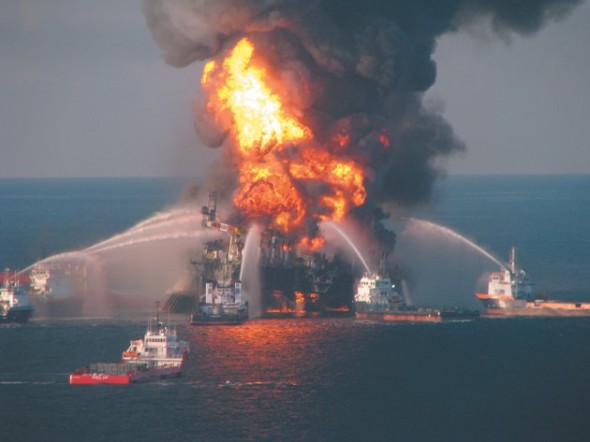
Fireboat response crews battling the blazing remnants of the Deepwater Horizon, the offshore drilling rig owned by Transocean that exploded when BP’s Macondo oil well ruptured in the Gulf of Mexico, April 21, 2010. Photo: U.S. Coast Guard
Journalist and author Peter Maass has reviewed four recently published books on the Deepwater Horizon disaster. Maass, whose book Crude World: The Violent Twilight of Oil is a searing indictment of the global oil industry, knows only too well that BP is hardly the bad apple. As he says in the review, “BP recklessly cut corners whenever it could, but so did Transocean, and so did—does—the rest of the fossil fuel industry.”
Understanding the Deepwater Horizon disaster is important then, because of what happened of course, but also because this can happen again, anywhere.
A great day for oil!
Transocean, remember them?
Transocean Ltd. had its “best year in safety performance” despite the explosion of its Deepwater Horizon rig that left 11 dead and oil gushing into the Gulf of Mexico, the world’s largest offshore-rig company said in a securities filing Friday.
Accordingly, Transocean’s executives received two-thirds of their target safety bonus. Safety accounts for 25% of the equation that determines the yearly cash bonuses, along with financial factors including new rig contracts
The payout contrasts with that for 2009, when the company withheld all executive bonuses after incurring four fatalities that year “to underscore the company’s commitment to safety.”
Deepwater Horizon spill leads to new safety measures…in the U.K.
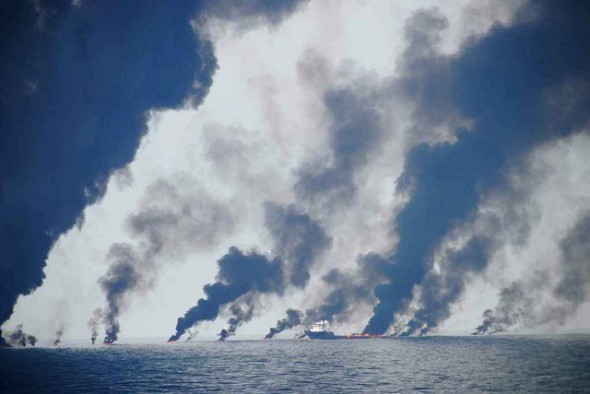
Deepwater Horizon Oil Spill - FSU Sampling Cruise - June 22, 2010. Photo courtesy Dr. Oscar Garcia / Florida State University.
I’ve been asking various officials in Ghana what they’re doing about regulation in light of the Deepwater Horizon disaster. I’m assured that the BP disaster is being studied. I hope to have an opportunity to ask similar questions to Tullow and other oil company executives sometime soon. In the meantime, I scan the trade press for news. Today, for instance, I found out that work is underway on a new well-capping device for the U.K.’s offshore industry. Continue reading . . .
Offshore drilling: “systemic” safety problems?
How safe are Ghana’s offshore oil drilling operations? According to officials I’ve interviewed here so far, Ghana’s oil operations are safe, secure and pose no particular threats to people or the environment. An EPA official in Takoradi assured me that the waters off the coast of Ghana are much calmer than those in the Gulf of Mexico. He also reminded me that the Deepwater Horizon spill was due to human error and that Ghana is constantly verifying every aspect of the oil operations in order to avoid any mistakes. Spin. Of course. After all, what are officials going to tell me? That they’re worried? Continue reading . . .
Thinking about offshore drilling
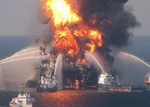 This morning I read Investigation into BP Spill Reveals Incompetence, Greed, Complacency and Cynicism — It’s Time for a New Energy Policy, by Michael Brune, Executive Director of the Sierra Club. The brief article discusses, Deep Water: The Gulf Oil Disaster and the Future of Offshore Drilling, the final report from the Obama-appointed investigative commission. Although the report and its recommendations concern the U.S., it is easy to see the significance for Africa, where oil offshore drilling is on the rise.
This morning I read Investigation into BP Spill Reveals Incompetence, Greed, Complacency and Cynicism — It’s Time for a New Energy Policy, by Michael Brune, Executive Director of the Sierra Club. The brief article discusses, Deep Water: The Gulf Oil Disaster and the Future of Offshore Drilling, the final report from the Obama-appointed investigative commission. Although the report and its recommendations concern the U.S., it is easy to see the significance for Africa, where oil offshore drilling is on the rise.
I’ve recently posted information about the Scottish company, Bowleven, and its new oil finds off the coast of Cameroon. This is no small story: exploration over the past few months indicates that these discoveries are even more promising than initially thought. And Cameroon is not alone. There are new finds in Nigeria. Ghana is now pumping offshore oil. From Sierra Leone to Angola, the entire Gulf of Guinea region is poised for major, new offshore development. Africa, and in particular the Gulf of Guinea, is one of the new oil “hot spots” attracting both the major oil companies (American, European, Chinese and Brazilian) and the “minnows” or “wildcats,” the smaller, independent companies who used to “explore-discover-sell,” but are now getting in on the drilling action, too. Spend a few minutes reading the trade papers and you’ll quickly get a sense that this is the new Wild West.
There’s money, and lots of it, to be made offshore. I remember reading once that the oil business in Equatorial Guinea worked well for the Americans. With all the activity offshore, work crews could be helicoptered in every few weeks. No need to get too close to the abysmal situation on the ground in the country. Oil money fuels the corruption, repression, income inequality and political instability in the country, but the offshore drilling continues without a hitch.
So far, at least. What we hear little about are the environmental risks and dangerous lack of regulation, oversight and response capability that are unfortunately the norm for much of the offshore drilling in the Gulf of Guinea. As I mentioned in a post several weeks ago, I’m looking into the oil spill response plans of Cameroon and other countries in the region. I have yet to see anything reassuring.
More to follow.
Gas Is Really Costing Us About $15 a Gallon

"Oil Tear," by George Osodi
Gas Is Really Costing Us About $15 a Gallon | | AlterNet.
Read this and think.
This excellent article details many of the “externalized” costs of oil production — costs that we pay through the myriad subsidies we provide to the oil companies. And one thing worth noting with this accounting: the costs of damage caused by drilling and spills in many developing countries can only be guesstimated. Standard operating procedure for oil companies working in locales far from prying journalists or vigilant authorities is to simply ignore environmental and economic damage.
Out of sight, out of mind.


